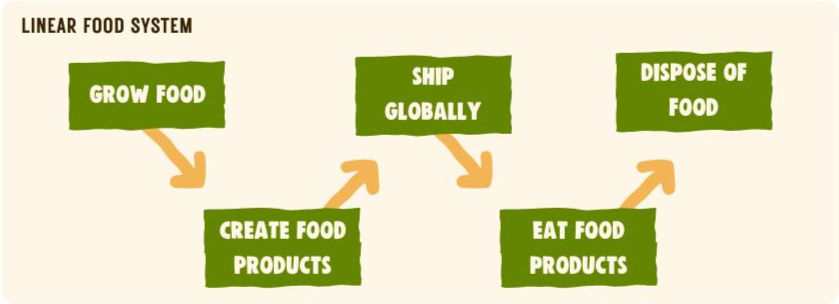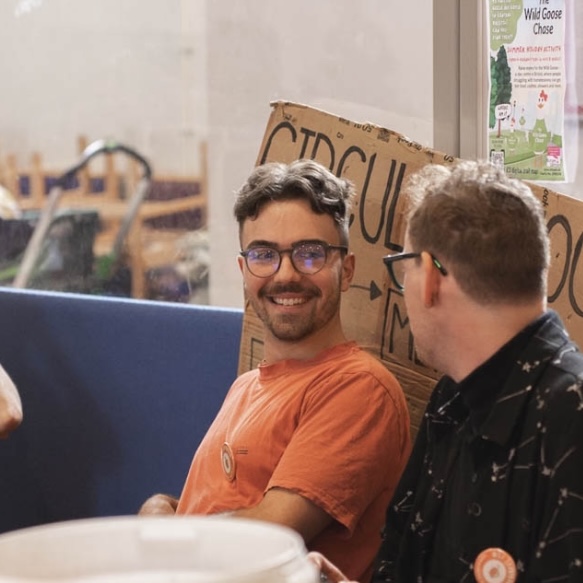How to Recycle Food Waste and Regenerate Healthy Soil
- Alex Montgomery
- Oct 20, 2025
- 4 min read
Updated: Oct 25, 2025
The Scale of the Problem
In the UK, households throw away over 9 million tonnes of food each year, enough to fill Wembley Stadium ten times. Much of it ends up in landfill, where it releases methane, a greenhouse gas 25 times stronger than CO₂. This is called a linear food system. One where we harvest crops from the land, eat what we want, and dispose of the leftovers; out of sight, out of mind. But this take-make-dispose model means we will run out of resources if we don't give back.

At Generation Soil, we believe the answer isn’t just waste reduction, it’s regeneration. Every peel, crust, or coffee ground has the potential to rebuild living soil and strengthen communities from the ground up. We need to forge a reciprocal relationship with our land. One where we give back.

What Is a Circular Food System and Why It Matters
The way we manage food in the UK is still mostly linear; we take, make, and throw away. This model depletes soils, wastes nutrients, and increases greenhouse gas emissions.
A circular food system, by contrast, keeps nutrients moving. What comes from the earth goes back to it. Food scraps become compost; compost rebuilds soil; healthy soil grows nutrient-dense food; and the cycle continues.
Circularity is gaining traction in policy, from DEFRA’s Resources and Waste Strategy to Bristol’s One City Plan, both of which call for nutrient-loop closure. Yet most food waste still leaves communities via long, carbon-intensive supply chains.
At Generation Soil, we’re proving that circular systems can thrive locally. Across Bristol and beyond, food waste isn’t rubbish, it’s a renewable resource waiting to be returned to the land.

Why Recycling Food Waste Is Essential for Soil and Climate
When food decomposes in landfill, it emits methane; when composted, it becomes a climate solution.
Recycling food waste helps to:
Cut methane emissions and landfill pressure
Rebuild organic matter and microbial life in soils
Support biodiversity in gardens and community plots
Reduce disposal costs for councils and businesses
Globally, food waste causes 8–10 % of total emissions. By acting locally, cities like Bristol can directly advance UN Sustainable Development Goal 12.3 by halving per-capita food waste. Every household caddy becomes a tool for climate action.
Innovative Ways to Recycle Food Waste in the UK
Modern composting blends science, tradition, and community action.
1️⃣ Anaerobic Digestion (AD)
AD breaks down food waste in oxygen-free tanks, producing biogas for energy and digestate for fertiliser.
✅ Efficient for large volumes.
⚠️ But nutrients rarely return locally. A “waste-to-energy” rather than “waste-to-soil” model.

2️⃣ In-Vessel Composting
Used by Generation Soil, enclosed systems accelerate decomposition while protecting beneficial microbes. We currently have two Ridan Pro 400s, but you can get smaller compost tumblers for home use.
✅ Compact, odour-free, ideal for urban areas like Bristol.

3️⃣ Food Waste Dehydration
Dehydrators remove moisture, cutting weight and smell.
✅ Great for restaurants and schools. Could work alongside compost hubs to reduce transport emissions.
If you need help setting up a composting system, we can help!
Policy and Economic Opportunity
Local composting isn’t just good for the planet; it’s good for local economies.
Studies show that community-scale composting creates 2–3 times more jobs per tonne of waste processed than industrial disposal. By keeping materials local, cities reduce hauling costs while training residents in soil management, horticulture, and green entrepreneurship.
The UK’s Circular Economy Package encourages precisely this: short, local supply loops that retain value. Generation Soil’s model demonstrates how grassroots projects can deliver on national climate and employment targets simultaneously.
How Community Composting Builds Regenerative Cities
Local composting doesn’t just recycle waste, it rebuilds relationships between people, food, and soil.
In the Bristol Living Compost Project, residents ferment household scraps with bokashi, transforming them into microbe-rich compost distributed across gardens, schools, and our Food Forest Market Garden.
In the first ten months, the project has diverted over 12,000 tons of food waste from landfill, turning a climate problem into living soil.
Each bucket is an act of regeneration:
Neighbours share knowledge and resources
Food waste becomes fertile soil
Communities reconnect to the living world beneath their feet

From Waste to Soil: The Science Behind Regeneration
Healthy soil teems with life. One teaspoon holds more microorganisms than humans on Earth. Composting feeds this underground soil food web (fungi, bacteria, worms, and more) that sustains plant growth.
Composting restores:
Carbon, improving structure and water retention
Nitrogen, fuel for plant growth
Microbial diversity, resilience against pests and drought
Industrial farming broke these cycles; community composting rebuilds them, returning carbon to the ground rather than the atmosphere. If you would like to learn more, we absolutely love running workshops!
Bristol and Beyond: Cities Leading the Circular Transition
Bristol is emerging as a UK leader in urban circularity. Initiatives like Generation Soil prove that small-scale systems can have city-wide impact.
These decentralised networks create resilience by:
Reducing dependence on national waste contracts
Cutting transport emissions
Empowering citizens as stewards of their environment
This shift from “waste management” to “resource regeneration” marks a new era of nutrient self-reliant cities.
How to Recycle Food Waste at Home
You don’t need a garden to join the movement:
Use a kitchen caddy to collect food scraps.
Compost locally through a hub or project.
Try Bokashi, ideal for flats and small kitchens.
Share and teach. Help others close the loop.
Each small habit builds the circular system we urgently need.
The Regenerative Future of Food Waste
Food waste recycling isn’t just about tidy bins; it’s about rebuilding living foundations for cities. Each compost bucket is a miniature ecosystem that captures carbon, nurtures life, and models circular thinking.
If every UK household composted its organic waste, we could:
Cut millions of tonnes of CO₂ annually
Generate thousands of tonnes of living soil
Support pollinators and urban biodiversity
Generation Soil’s work proves that sustainability starts in the kitchen but ends in the soil. Scaling such community systems nationwide could redefine how Britain feeds itself. Cleanly, locally, and regeneratively.
If the systems we use were built for the 19th century, it’s time to create the ones for the 21st.
Join the Bristol Living Compost Project, volunteer, or partner with Generation Soil to bring circular waste systems to your community.



Comments